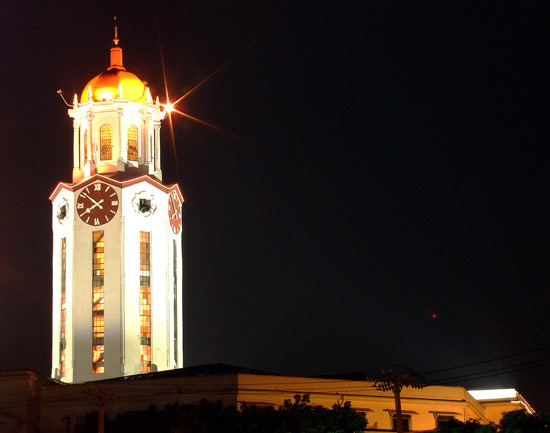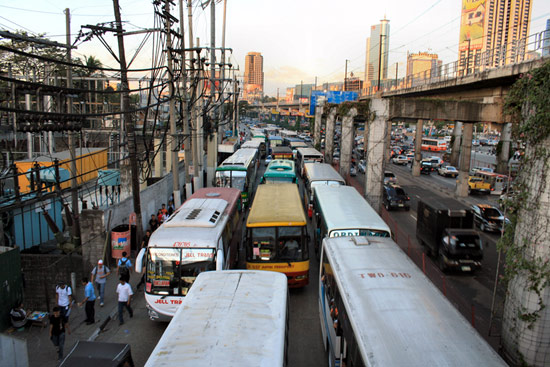Culture and Society: Time Orientation
Perception of Time
Most Filipinos regard time as a linear progression of events. Both Catholics (the majority religion) and Muslims on the southern islands subscribe to a notion of an afterlife. Some tribes in the outer provinces take a more cyclical approach, believing in the reincarnation of ancestors. Other communities hold that ghosts and spirits walk the earth alongside mortals so, for them, there is no clear distinction between real world time and metaphysical "dream time."
Filipino Catholics also perceive life through the lens of bahala na (come what may), meaning the passage of time and events is not in the hands of mortals, but controlled by God. There may also be environmental reasons for this: the archipelago’s inclement weather frequently causes unexpected delays.
Filipino society tends to be short-term in its outlook. Bahala na stops people from planning too far ahead as they feel they lack the free will to influence upcoming matters. On a more practical level, economic conditions limit people to thinking only about the next pay day. Unlike their counterparts in almost every other Asian country, Filipinos are not overly concerned with saving money for the future.
Traditional Calendar
Philippine society uses the 365-day Gregorian calendar, introduced by the Spanish colonial authorities in the sixteenth century. The calendar is based upon the life of Jesus Christ. The years prior to his birth are followed by the initials B.C. (Before Christ), and those after his birth by C.E. (for Anno Domini, meaning "In the year of our Lord"). Both continuums start at the number one; there is no year zero.
Filipinos take religious holidays seriously, celebrating more typically Christian festivals such as Christmas, Easter, and All Saints’ Day as well as those that mix indigenous customs with Catholic dogma, such as the Feast of the Black Nazarene.
Attitude Toward Time
Filipinos have a relaxed attitude to timekeeping and people often show up 10 to 30 minutes after the agreed-upon time. In the hot, overcrowded, and traffic-jammed cities of this country, the popular view is that it’s just not worth trying to race from one place to another or set tight deadlines. At any rate, in this family-oriented society, caring for kith and kin is more highly valued than being punctual for work, social engagements, or other commitments. Bahala na represents a certain faith and optimism that everything will turn out for the best regardless of how one manages one’s time. This relaxed attitude informs interpersonal dealings too, as Filipinos tend to avoid criticizing each other for issues such as lateness lest they cause hiya (the taboo of public embarrassment).
Taking one’s time to make a decision or complete a task is generally regarded as wise and unlikely to lead to rash errors of judgment. Filipinos are usually polychronic, managing different work tasks simultaneously and interspersing business with pleasure, such as writing reports or reading work documents while socializing at a bar or restaurant.
Social Engagements
Most Filipinos arrive 15 to 30 minutes after the stated start time for parties, dinners, and other social events. Being punctual may sometimes be construed as pushy or overconfident, and may place added pressure on the host. Filipino people tend to be a little more prompt for one-to-one meetings (when there is a risk that someone will be left bored on their own) and restaurant bookings.
Business Engagements
When Filipino businesspeople are first forming a working relationship, punctuality for meetings is preferred. This becomes less important as trust between parties blossoms and socializing outside of the work environment (at the bar, the golf course, etc.) starts to happen. Amiable small talk usually takes place before and after official business is discussed, for which time is reserved. It is deemed polite to speak at length in order to demonstrate interest and professionalism; short replies are sometimes construed as discourteous.
Service and production deadlines in Philippine industry are more like vague guidelines, with precise dates and times rarely observed. When making enquiries about progress on a project or task, Filipino businesspeople typically remain upbeat and friendly for fear of applying unwelcome pressure or causing hiya.
Given the infamous gridlocks of large cities like Manila and common natural hazards such as flooding and tropical storms, businesspeople tend to leave plenty of time for traveling to and from meetings.
Article written for World Trade Press by Tom Sykes.
Copyright © 1993—2025 World Trade Press. All rights reserved.

 Philippines
Philippines 
